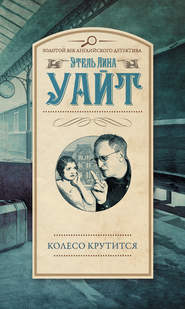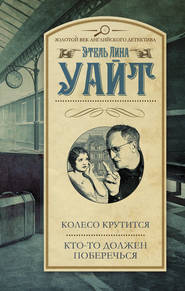По всем вопросам обращайтесь на: info@litportal.ru
(©) 2003-2025.
✖
Колесо крутится. Леди исчезает / The Wheel Spins. The Lady Vanishe
Настройки чтения
Размер шрифта
Высота строк
Поля
“Liar,” thought Iris automatically.
She was in a state of utter fatigue, which bordered on collapse. It was only by the exercise of every atom of willpower that she forced herself to reach the hotel. The ordeal had strained her nerves almost to breaking-point. Although she longed for the quiet of her room, she knew she could not mount the stairs without a short rest. Every muscle felt wrenched as she dropped down on an iron chair and closed her eyes.
“If any one speaks to me, I’ll scream,” she thought.
The Misses Flood-Porter exchanged glances and turned down the corners of their mouths. Even gentle Mrs. Barnes’ soft brown eyes held no welcome, for she had been a special victim of the crowd’s bad manners and selfishness.
They behaved as though they had bought the hotel and the other guests were interlopers, exacting preferential treatment – and getting it – by bribery. This infringement of fair-dealing annoyed the other tourists, as they adhered to the terms of their payment to a travelling agency, which included service.
The crowd monopolised the billiard-table and secured the best chairs. They were always served first at meals; courses gave out, and bath-water ran luke-warm.
Even the vicar found that his charity was strained. He did his best to make allowance for the animal spirits of youth, although he was aware that several among the party could not be termed juvenile.
Unfortunately, Iris’ so-called friends included two persons who were no testimonial for the English nation; and since it was difficult to distinguish one girl in a bathing-brief from another, Mrs. Barnes was of the opinion that they were all doing the same thing – getting drunk and making love.
Her standard of decency was offended by the sun-bathing – her nights disturbed by noise. Therefore she was specially grateful for the prospect of two peaceful days, spent amid glorious scenery and in congenial company.
But, apparently, there was not a complete clearance of the crowd; there was a hangover, in this girl – and there might be others. Mrs. Barnes had vaguely remarked Iris, because she was pretty, and had been pursued by a bathing-gentleman with a matronly figure.
As the man was married, his selection was not to her credit. But she seemed to be so exhausted that Mrs. Barnes’ kindly heart soon reproached her for lack of sympathy.
“Are you left all alone?” she called, in her brightest tones.
Iris shuddered at the unexpected overture. At that moment the last thing in the world she wanted was mature interest, which, in her experience, masked curiosity.
“Yes,” she replied.
“Oh, dear, what a shame. Aren’t you lonely?”
“No.”
“But you’re rather young to be travelling without friends. Couldn’t any of your people come with you?”
“I have none.”
“No family at all?”
“No, and no relatives. Aren’t I lucky?”
Iris was not near enough to hear the horrified gasp of the Misses Flood-Porter; but Mrs. Barnes’ silence told her that her snub had not miscarried. To avoid a further inquisition, she made a supreme effort to rise, for she was stiffening in every joint, and managed to drag herself into the hotel and upstairs to her room.
Mrs. Barnes tried to carry off the incident with a laugh.
“I’m afraid I’ve blundered again,” she said. “She plainly resented me. But it seemed hardly human for us to sit like dummies, and show no interest in her.”
“Is she interested in you?” demanded Miss Rose. “Or in us? That sort of girl is utterly selfish. She wouldn’t raise a finger, or go an inch out of her way, to help any one.”
There was only one answer to the question, which Mrs. Barnes was too kind to make. So she remained silent, since she could not tell a lie.
Neither she – nor any one else – could foretell the course of the next twenty-four hours, when this girl – standing alone against a cloud of witnesses – would endure such anguish of spirit as threatened her sanity, on behalf of a stranger for whom she had no personal feeling.
Or rather – if there was actually such a person as Miss Froy.
Chapter four. England calling
Because she had a square on her palm, which, according to a fortune-teller, signified safety, Iris believed that she lived in a protected area. Although she laughed at the time, she was impressed secretly, because hers was a specially sheltered life.
At this crisis, the stars, as usual, seemed to be fighting for her. The mountains had sent out a preliminary warning. During the evening, too, she received overtures of companionship, which might have delivered her from mental isolation.
Yet she deliberately cut every strand which linked her with safety, out of mistaken loyalty to her friends.
She missed them directly she entered the lounge, which was silent and deserted. As she walked along the corridor, she passed empty bedrooms, with stripped beds and littered floors. Mattresses hung from every window and the small verandas were heaped with pillows.
It was not only company which was lacking, but moral support. The crowd never troubled to change for the evening, unless comfort suggested flannel trousers. On one occasion, it had achieved the triumph of a complaint, when a lady appeared at dinner dressed in her bathing-slip.
The plaintiffs had been the Misses Flood-Porter, who always wore expensive but sober dinner-gowns. Iris remembered the incident, when she had finished her bath. Although slightly ashamed of her deference to public opinion, she fished from a suitcase an unpacked afternoon frock of crinkled crêpe.
The hot soak and rest had refreshed her, but she felt lonely, as she leaned over the balustrade. Her pensive pose and the graceful lines of her dress arrested the attention of the bridegroom – Todhunter, according to the register – as he strolled out of his bedroom.
He had not the least knowledge of her identity, or that he had acted as a sort of guiding-star to her, in the gorge. He and his wife took their meals in their private sitting-room and never mingled with the crowd. He concluded, therefore, that she was an odd guest whom he had missed in the general scramble.
Approving her with an experienced eye, he stopped.
“Quiet, to-night,” he remarked. “Refreshing change after the din of that horrible rabble.”
To his surprise, the girl looked coldly at him.
“It is quiet,” she said. “But I happen to miss my friends.”
As she walked downstairs she felt defiantly glad that she had made him realise his blunder. Championship of her friends mattered more than the absence of social sense. But, in spite of her triumph, the incident was vaguely unpleasant.
The crowd had gloried in its unpopularity, which seemed to it a sign of superiority. It frequently remarked in complacent voices, “We’re not popular with these people,” or “They don’t really like us.” Under the influence of its mass-hypnotism, Iris wanted no other label. But now that she was alone, it was not quite so amusing to realise that the other guests, who were presumably decent and well-bred, considered her an outsider.
Her mood was bleakly defiant when she entered the restaurant. It was a big bare room, hung with stiff deep-blue wallpaper, patterned with conventional gilt stars. The electric lights were set in clumsy wrought-iron chandeliers, which suggested a Hollywood set for a medieval castle. Scarcely any of the tables were laid, and only one waiter drooped at the door.
In a few days, the hotel would be shut up for the winter. With the departure of the big English party, most of the holiday staff had become superfluous and had already gone back to their homes in the district.
The remaining guests appeared to be unaffected by the air of neglect and desolation inseparable from the end of the season. The Misses Flood-Porter shared a table with the vicar and his wife. They were all in excellent spirits and gave the impression of having come into their own, as they capped each other’s jokes, culled from Punch.
Iris pointedly chose a small table in a far corner. She smoked a cigarette while she waited to be served. The others were advanced in their meal and it was a novel sensation for one of the crowd to be in arrears.
Mrs. Barnes, who was too generous to nurse resentment for her snub, looked at her with admiring eyes.
“How pretty that girl looks in a frock,” she said.
“Afternoon frock,” qualified Miss Flood-Porter. “We always make a point of wearing evening dress for dinner, when we’re on the Continent.”
“If we didn’t dress, we should feel we were letting England down,” explained the younger sister.
She was in a state of utter fatigue, which bordered on collapse. It was only by the exercise of every atom of willpower that she forced herself to reach the hotel. The ordeal had strained her nerves almost to breaking-point. Although she longed for the quiet of her room, she knew she could not mount the stairs without a short rest. Every muscle felt wrenched as she dropped down on an iron chair and closed her eyes.
“If any one speaks to me, I’ll scream,” she thought.
The Misses Flood-Porter exchanged glances and turned down the corners of their mouths. Even gentle Mrs. Barnes’ soft brown eyes held no welcome, for she had been a special victim of the crowd’s bad manners and selfishness.
They behaved as though they had bought the hotel and the other guests were interlopers, exacting preferential treatment – and getting it – by bribery. This infringement of fair-dealing annoyed the other tourists, as they adhered to the terms of their payment to a travelling agency, which included service.
The crowd monopolised the billiard-table and secured the best chairs. They were always served first at meals; courses gave out, and bath-water ran luke-warm.
Even the vicar found that his charity was strained. He did his best to make allowance for the animal spirits of youth, although he was aware that several among the party could not be termed juvenile.
Unfortunately, Iris’ so-called friends included two persons who were no testimonial for the English nation; and since it was difficult to distinguish one girl in a bathing-brief from another, Mrs. Barnes was of the opinion that they were all doing the same thing – getting drunk and making love.
Her standard of decency was offended by the sun-bathing – her nights disturbed by noise. Therefore she was specially grateful for the prospect of two peaceful days, spent amid glorious scenery and in congenial company.
But, apparently, there was not a complete clearance of the crowd; there was a hangover, in this girl – and there might be others. Mrs. Barnes had vaguely remarked Iris, because she was pretty, and had been pursued by a bathing-gentleman with a matronly figure.
As the man was married, his selection was not to her credit. But she seemed to be so exhausted that Mrs. Barnes’ kindly heart soon reproached her for lack of sympathy.
“Are you left all alone?” she called, in her brightest tones.
Iris shuddered at the unexpected overture. At that moment the last thing in the world she wanted was mature interest, which, in her experience, masked curiosity.
“Yes,” she replied.
“Oh, dear, what a shame. Aren’t you lonely?”
“No.”
“But you’re rather young to be travelling without friends. Couldn’t any of your people come with you?”
“I have none.”
“No family at all?”
“No, and no relatives. Aren’t I lucky?”
Iris was not near enough to hear the horrified gasp of the Misses Flood-Porter; but Mrs. Barnes’ silence told her that her snub had not miscarried. To avoid a further inquisition, she made a supreme effort to rise, for she was stiffening in every joint, and managed to drag herself into the hotel and upstairs to her room.
Mrs. Barnes tried to carry off the incident with a laugh.
“I’m afraid I’ve blundered again,” she said. “She plainly resented me. But it seemed hardly human for us to sit like dummies, and show no interest in her.”
“Is she interested in you?” demanded Miss Rose. “Or in us? That sort of girl is utterly selfish. She wouldn’t raise a finger, or go an inch out of her way, to help any one.”
There was only one answer to the question, which Mrs. Barnes was too kind to make. So she remained silent, since she could not tell a lie.
Neither she – nor any one else – could foretell the course of the next twenty-four hours, when this girl – standing alone against a cloud of witnesses – would endure such anguish of spirit as threatened her sanity, on behalf of a stranger for whom she had no personal feeling.
Or rather – if there was actually such a person as Miss Froy.
Chapter four. England calling
Because she had a square on her palm, which, according to a fortune-teller, signified safety, Iris believed that she lived in a protected area. Although she laughed at the time, she was impressed secretly, because hers was a specially sheltered life.
At this crisis, the stars, as usual, seemed to be fighting for her. The mountains had sent out a preliminary warning. During the evening, too, she received overtures of companionship, which might have delivered her from mental isolation.
Yet she deliberately cut every strand which linked her with safety, out of mistaken loyalty to her friends.
She missed them directly she entered the lounge, which was silent and deserted. As she walked along the corridor, she passed empty bedrooms, with stripped beds and littered floors. Mattresses hung from every window and the small verandas were heaped with pillows.
It was not only company which was lacking, but moral support. The crowd never troubled to change for the evening, unless comfort suggested flannel trousers. On one occasion, it had achieved the triumph of a complaint, when a lady appeared at dinner dressed in her bathing-slip.
The plaintiffs had been the Misses Flood-Porter, who always wore expensive but sober dinner-gowns. Iris remembered the incident, when she had finished her bath. Although slightly ashamed of her deference to public opinion, she fished from a suitcase an unpacked afternoon frock of crinkled crêpe.
The hot soak and rest had refreshed her, but she felt lonely, as she leaned over the balustrade. Her pensive pose and the graceful lines of her dress arrested the attention of the bridegroom – Todhunter, according to the register – as he strolled out of his bedroom.
He had not the least knowledge of her identity, or that he had acted as a sort of guiding-star to her, in the gorge. He and his wife took their meals in their private sitting-room and never mingled with the crowd. He concluded, therefore, that she was an odd guest whom he had missed in the general scramble.
Approving her with an experienced eye, he stopped.
“Quiet, to-night,” he remarked. “Refreshing change after the din of that horrible rabble.”
To his surprise, the girl looked coldly at him.
“It is quiet,” she said. “But I happen to miss my friends.”
As she walked downstairs she felt defiantly glad that she had made him realise his blunder. Championship of her friends mattered more than the absence of social sense. But, in spite of her triumph, the incident was vaguely unpleasant.
The crowd had gloried in its unpopularity, which seemed to it a sign of superiority. It frequently remarked in complacent voices, “We’re not popular with these people,” or “They don’t really like us.” Under the influence of its mass-hypnotism, Iris wanted no other label. But now that she was alone, it was not quite so amusing to realise that the other guests, who were presumably decent and well-bred, considered her an outsider.
Her mood was bleakly defiant when she entered the restaurant. It was a big bare room, hung with stiff deep-blue wallpaper, patterned with conventional gilt stars. The electric lights were set in clumsy wrought-iron chandeliers, which suggested a Hollywood set for a medieval castle. Scarcely any of the tables were laid, and only one waiter drooped at the door.
In a few days, the hotel would be shut up for the winter. With the departure of the big English party, most of the holiday staff had become superfluous and had already gone back to their homes in the district.
The remaining guests appeared to be unaffected by the air of neglect and desolation inseparable from the end of the season. The Misses Flood-Porter shared a table with the vicar and his wife. They were all in excellent spirits and gave the impression of having come into their own, as they capped each other’s jokes, culled from Punch.
Iris pointedly chose a small table in a far corner. She smoked a cigarette while she waited to be served. The others were advanced in their meal and it was a novel sensation for one of the crowd to be in arrears.
Mrs. Barnes, who was too generous to nurse resentment for her snub, looked at her with admiring eyes.
“How pretty that girl looks in a frock,” she said.
“Afternoon frock,” qualified Miss Flood-Porter. “We always make a point of wearing evening dress for dinner, when we’re on the Continent.”
“If we didn’t dress, we should feel we were letting England down,” explained the younger sister.









